As we age, maintaining both physical and mental health becomes increasingly important, especially for seniors living with dementia. Engaging in simple yet meaningful activities can stimulate the mind, improve mood, and enhance overall well-being. From morning walks to listening to music, these activities not only provide joy but also help slow cognitive decline and reduce feelings of isolation.
Here are 7 effective activities that can support seniors with dementia and promote a happier, healthier lifestyle:-
According to Neha Sinha, Dementia Specialist, CEO & Co-founder of Epoch Elder Care, “A dementia diagnosis can feel immobilizing, with an average life expectancy of around 8–10 years. Yet decline is not uniform. The right activities preserve clarity, movement, and dignity.”
Physical activity – Morning walks, light dance, or cycling improve balance, circulation, and cognition while reducing risks of diabetes and hypertension.
Cognitive stimulation – Crosswords, card games, or tailored digital games keep minds engaged and connected.
Arts and crafts – Creative expression strengthens fine motor skills and improves mood.
Reminiscence – Old photos or music reinforce identity and memory.
Music & singing – Musical memory often endures, lowering anxiety and fostering joy.
Mindfulness – Breathing, meditation, or guided relaxation reduces stress and aids sleep.
Sensory stimulation – Gardening, cooking, or hobbies evoke memories and restore purpose.
These are not diversions but lifelines—daily affirmations that even with dementia, identity and joy endure.
According to Dr. Prasun Chatterjee, Chief – Geriatric Medicine, Artemis Hospitals, “Seniors with dementia can benefit greatly from gentle activities like morning walks and music. Walking outside in the fresh air makes you feel better, helps you move around, and helps you sleep.”
Listening to music you know can help you remember things and calm your nerves.
Playing simple games or doing puzzles keeps the brain busy.
Art, painting, or crafts let you express yourself without feeling pressured.
Gardening helps them relax and feel more connected to nature.
Reading out loud or telling stories can help you remember things and pay attention.
Most importantly, spending time with other people, whether it’s family or community groups, helps seniors feel less lonely and gives them a sense of belonging and happiness.
According to Dr Kaustubh Mahajan, Consultant, Neurology at P.D. Hinduja Hospital & MRC, Khar, “Uninterrupted sleep is responsible for memory consolidation and the clearing of unwanted connections during sleep, which helps to improve memory and cognitive health significantly.”
Daily exercise, aerobic activity at least half an hour daily in the form of simple walking or cycling, definitely helps. The simple rule that “more movement, better brain health” should be understood. Once you get home-bound or bed-bound, neurodegeneration starts rapidly.
Challenging your brain – the more challenges or hardships, the more the brain remains active and healthy, e.g., going for a marathon/walkathon.
Increasing brain reserve – by learning anything new and doing it daily helps. Example: learning a new language or a musical instrument and practising it daily helps brain health and improves your brain reserve. Even dancing keeps you physically active, and learning the steps keeps increasing the brain reserve. Overall, activities help significantly in declining cognitive worsening, but remember these need to be done on a regular basis.
Diet – Eating a healthy diet, which is comprised mainly of the Mediterranean diet in the form of vegetables and fruits, is significantly healthy with respect to all the research which shows for cognitive health.
Having a purpose – Retirement is not good for well-being. One should be able to keep him or herself physically and mentally active in some work so that the brain remains busy.
Socialisation – Meeting people and talking also helps the brain to remain active.
Supporting seniors with dementia through engaging activities can make a significant difference in their quality of life. Simple routines like morning walks, music therapy, and other stimulating activities not only enhance cognitive function but also bring joy, connection, and a sense of purpose. By incorporating these practices into daily life, caregivers and families can help seniors feel valued, active, and emotionally supported, creating a nurturing environment that promotes both mental and physical well-being.

